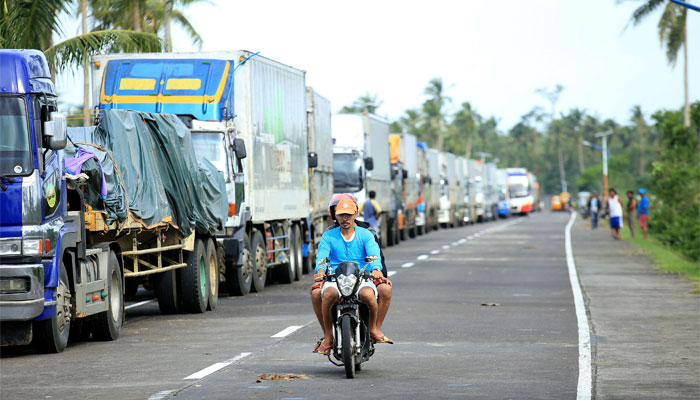A motorist drives past long queue of stranded cargo trucks and passenger buses caused by typhoon Melor, near the town of Matnog Sorsogon province, south of Manila yesterday. AFP
AFP/Manila
Rain-soaked residents in the rural Philippines huddled on rooftops Wednesday after Typhoon Melor caused heavy flooding and killed at least nine people, authorities said.
A barrage of rain in the capital Manila on Tuesday night submerged some roads and caused traffic chaos, although flooding in the megacity of 12 million had subsided by Wednesday morning.
The death toll climbed after authorities on Mindoro, a large farming island of 1.2 million roughly 120 kilometres (75 miles) south of the capital, reported five people had died there.
Mindoro governor Alfonso Umali said floodwaters rose sharply in parts of the island on Tuesday night, forcing residents to climb onto the roofs of their homes.
"The floods have begun to subside but there are still people on their roofs. Many homes were damaged. We are going to the areas on board the coast guard's rubber boats today," Umali said on DZMM radio.
After drifting slowly across Mindoro overnight, Melor moved out into the South China Sea on Wednesday morning, according to the weather bureau.
But forecasters warned it could still cause rain of up to 30 millimetres (over an inch) per hour in Manila and surrounding provinces, although Mindoro was expected to not be as badly hit.
Four others were earlier reported killed on Samar, an impoverished island of 1.5 million people in the eastern Philippines, where Melor first tore in from the Pacific Ocean on Monday afternoon.
Millions of people were also without power in the eastern Philippines and Mindoro, with no guarantees electricity would be restored before Christmas.
And 120,000 people remained in storm shelters, the national disaster council said.
"This is going to be a sad Christmas for us," Umali said.
Meanwhile, the weather bureau said it was monitoring another storm brewing over the Pacific east of the main southern island of Mindanao.
The Philippines is hit by an average of 20 typhoons a year, many of them deadly, with the strongest often happening towards the end of the year.
The most recent deadly storm to hit the country, Koppu, killed 54 people and forced tens of thousands to flee their homes after it pummelled rice-growing northern provinces in October.
In November 2013, one of the strongest typhoons on record, Haiyan, flattened entire communities in the central region with tsunami-like waves, leaving 7,350 people dead or missing.

